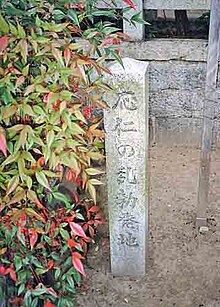Onin War
| Ōnin War | ||||||||
|---|---|---|---|---|---|---|---|---|
 Marker at location of outbreak of the Ōnin War |
||||||||
|
||||||||
| Belligerents | ||||||||
|
||||||||
| Commanders and leaders | ||||||||
|
|
|
||||||
The Ōnin War (応仁の乱 Ōnin no Ran?) was a civil war that lasted from 1467 to 1477, during the Muromachi period in Japan. Ōnin refers to the Japanese era during which the war was fought. A dispute between Hosokawa Katsumoto and Yamana Sōzen escalated into a nationwide war involving the Ashikaga shogunate and a number of daimyōs in many regions of Japan.
The war initiated the Sengoku period, "the Warring States period". This period was a long, drawn-out struggle for domination by individual daimyo, resulting in a mass power-struggle between the various houses to dominate the whole of Japan.
The Ōnin conflict began as a controversy over who would succeed Shogun Ashikaga Yoshimasa. In 1464, Yoshimasa had no heir. He persuaded his younger brother, Ashikaga Yoshimi, to abandon the life of a monk, and named him heir. In 1465, the unanticipated birth of a son to Yoshimasa put these plans in question. The infant, Yoshihisa, caused friction between the Shogun, Yoshimi, and Hosokawa against Tomiko, the wife of Yoshimasa and mother of Yoshihisa, and Yamana.
Hosokawa had always worked closely with the Shogun's brother Ashikaga Yoshimi, and supported his claim to the shogunate. Yamana took this as an opportunity to oppose Hosokawa further, supporting the child as heir to the Shogunate. War broke out in the city of Kyoto. This was regarded by the Ashikaga Shogun as an act of rebellion, and thus the Ashikaga and their supporters were forced to try to stop it. The Ashikaga tried to prevent the outbreak of war over the next heir, but the situation escalated into a war that designated the leader of the victorious party as the next shogun. In 1467 the uncertainty had caused a split amongst the warrior clans, and the succession dispute became a pretext for a struggle for military supremacy. In the end, there was no clear-cut winner. The complex array of factional armies simply fought themselves into exhaustion.
...
Wikipedia
